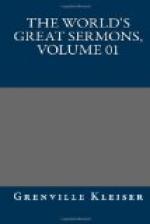Others depend upon ourselves; such as ruling one’s passions, or not putting a bridle on one’s pleasures; the mastery of anger, or resistance against him who irritates us; truth-telling or lying, the maintenance of a sweet and well-regulated disposition, or of a mood fierce and swollen and exalted with pride. Here you are the master of your actions. Do not look for the guiding cause beyond yourself, but recognize that evil, rightly so called, has no other origin than our voluntary falls. If it were involuntary, and did not depend upon ourselves, the laws would not have so much terror for the guilty, and the tribunals would not be so pitiless when they condemn wretches according to the measure of their crimes.
But enough concerning evil rightly so called. Sickness, poverty, obscurity, death, finally all human afflictions, ought not to be ranked as evils, since we do not count among the greatest boons things which are their opposites. Among these afflictions some are the effect of nature, others have obviously been for many a source of advantage. Let us be silent for the moment about these metaphors and allegories, and, simply following without vain curiosity the words of Holy Scripture, let us take from darkness the idea which it gives us.
But reason asks, Was darkness created with the world? Is it older than light? Why, in spite of its inferiority, has it preceded it? Darkness, we reply, did not exist in essence; it is a condition produced in the air by the withdrawal of light. What, then, is that light which disappeared suddenly from the world so that darkness should cover the face of the deep? If anything had existed before the formation of this sensible and perishable world, no doubt we conclude it would have been in the light. The orders of angels, the heavenly hosts, all intellectual natures named or unnamed, all the ministering spirits, did not live in darkness, but enjoyed a condition fitted for them in light and spiritual joy.
No one will contradict this, least of all he who looks for celestial light as one of the rewards promised to virtue—the light which, as Solomon says, is always a light to the righteous, the light which made the apostle say, “Giving thanks unto the Father, which hath made us meet to be partakers of the inheritance of the saints in light.” Finally, if the condemned are sent into outer darkness, evidently those who are made worthy of God’s approval are at rest in heavenly light. When, then, according to the order of God, the heaven appeared, enveloping all that its circumference included, a vast and unbroken body separating outer things from those which it enclosed, it necessarily kept the space inside in darkness for want of communication with the outer light.




